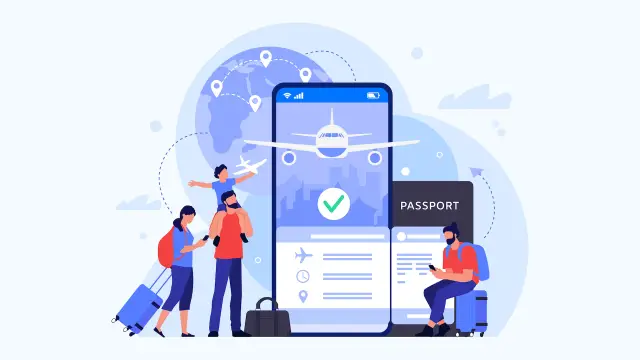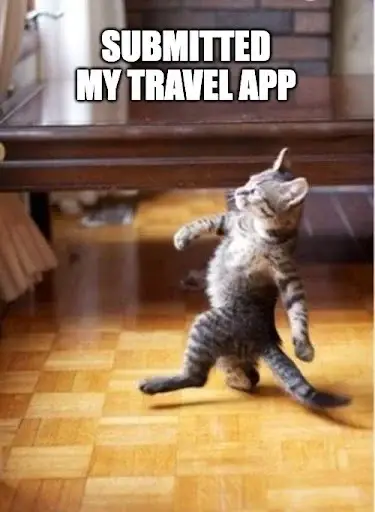Tips on useful travel app creating
Learn what needs to make a successful travel app.

We live in times when we use our mobile devices for almost anything, and we want to use them for anything! We want to communicate, buy, sell, and pay with them, and we also want to travel with them! App development is, without any doubt, a growing sector and an excellent opportunity for entrepreneurs. Speaking of travel, many different types of mobile apps have now become a great resource for travelers, even more than mobile websites: at any moment, they can make sure they aren't lost, they can book a hotel, they can book any activity (buy tickets for a concert or a museum, book a table at a restaurant) or call a cab. Travel apps are also an opportunity for all travel hospitality services and businesses. What does it mean for digital entrepreneurs? That the travel application sector is a great opportunity!

There are tons of different needs that can be fulfilled with an app, and these are all niches in the market that you could fill with a travel application. However, of course, there are many parameters that you need to take into consideration for your app development project: budget, features, targeted users, and more. In this article, we're going to dig into the travel app development world so that you can get a better idea of what kind of opportunity it is and how to exploit it.
What does a travel app need?
Before considering how much a travel application can cost and how you can make it successful, you need to focus on what a travel application needs. What are the features that you and your development team need to put in place so that any traveler can have anything they need in the palm of their hand through their mobile while traveling? How can you make your service available with an application other than the traditional but less usable mobile websites? When you have clear all the features that you need to put into one application, you can move on to consider costs, marketing, development team hiring, and other aspects.
Travel apps are a sort of intermediary between travel hospitality services and travelers. This is an important aspect to consider: in most cases, your app wouldn't work unless it involves travel hospitality services as well as common users. The main features of a travel application are the following:
Transportation
The first thing any traveler does when they travel is moving from one place to another. To travel means to move; when you think of a place to visit, the first thing you think of is how to get there. Because of all these reasons, the very first feature that identifies travel apps or mobile websites for traveling is the possibility of booking transportation. Transportation is an umbrella that can include tons of different services:
- purchasing fly tickets,
- purchasing train and bus tickets
- purchasing city transportation tickets (metro, city buses)
- calling a cab
The world of transport is changing and providing new opportunities even for travel app development workers. Electric scooters and bikes are more and more common on city roads all around the world: travel apps can also include features that allow users to rent one of these sustainable means of transport or trip planning features. To make this app usable, it'll require map integration features: make sure that your development team includes an expert in this area. It also requires agreements with travel hospitality related to the transport sector.
Booking
The second thing users need when they travel is a place to spend the night. Travel apps that allow users to book a hotel or any other kind of room directly from their mobile are very successful, even though the competition is very high. However, when it comes to booking, you shouldn't only focus on hotels and rooms; travelers also book museum visits or other activities.
Reservation
Besides a place to sleep, travelers need a place to eat. Developing an application that allows users to reserve a table for their dinners and lunches can become very successful: it wouldn't only be targeted at travelers since people would use travel apps like this also to book reservations in their hometown restaurants.
Reviews
There is a lot of competition for travel apps that deal with reviews. However, including review features within your travel app can make your app development more complete.
Map & navigation
Again, developing a navigation app and making it successful would be extremely difficult since the Google competition is almost impossible to beat. The map integration navigation features can also be complicated to develop. However, you could include map or navigation features within your app (maybe even integrating it with Google maps itself)
Emergency service
Let's start talking about more minor standard features. Because they're less common, it could be a more significant opportunity for any digital entrepreneur. When you are in a place outside your country, you are rarely informed about how to call any emergency services. An app that allows you to call emergency services from your mobile, even if you don't know the emergency numbers, would be a precious tool for any traveler. This type of application would need a map integration feature.
Weather forecasting
Any traveler would check the weather more than once per day; that's why weather forecasting apps can be successful. When building a travel app, keep this in mind and consider adding weather forecasting features to your travel app, integrating a mobile website for weather forecasting, or creating an app just for this purpose.
Trip planning
Many travelers need apps to plan trips. They all write their plan down somewhere, but having it with them on their mobile with a trip planning app would be more convenient. You could develop a travel app that allows them to plan their trip and keep on checking their plan even during the trip itself.
Please notice that not every travel app is provided with all these features. Let's take a famous example: booking.com is a travel app that doesn't have transportation or weather forecasting features. Yet, it is one of the most successful applications for traveling in the world. When developing your travel app, you can focus on one or some features: however, keep in mind that the features you select will determine the market niche you'll place your app in and your targeted users.
How does a travel app work?
There are two main types of travel apps: apps to plan trips that users use to organize their trips (that they use, that is, from home, from their hotel, from the airport), and the ones they use on the go.
Trip planning apps
Trip planning apps are easier to develop because they don't need, for example, geolocation map integration and map integration navigation. These types of mobile travel apps are mainly trip planning booking apps: they allow the users to browse through the available hotels, restaurants, museums, and more from their mobile devices, but they could also be more advanced than this. Your dedicated development team could include in your trip planning booking app a feature that allows users not only to browse but also to book directly from the mobile travel app. Another way to upgrade this kind of trip planning application would be to integrate planning features: features that allow users to save locations they want to visit, time schedules, and more.
When you build a travel app like this, there is one more challenge other than app development: in many cases, you'll need to find agreements with the travel hospitality industry. In other words, you need enterprises active in the hospitality industry to sign up for your service. You can make this passage automatic (travel hospitality industry businesses could sign up directly from your application), but you need to let them know that the app exists. It means that the first target for your marketing campaigns would be the travel hospitality industry itself.
On the go apps
For these types of applications, you may need to become an intermediary between users and the travel hospitality industry as well, but in this case, the most important feature would be the geolocation map integration. The app development process could become more complex because from the application, the user needs to be capable of geolocating their mobile devices and, through the map integration, see the service in their whereabouts, whether they are travel hospitality services, emergency services, transportation availability. When it comes to costs, these last types of mobile travel apps, especially if they require map integration, would cost much more than the first, because the app development process is more complicated and you may need to hire a larger dedicated development team.
What makes a travel app successful?

As we've mentioned, the sector of app development is very saturated, and the travel app development one makes no exception. It means that your competition when you decide to build a travel app is extremely high. We should not forget that other than various types of mobile apps, there are also a lot of mobile websites that offer the same services, so how can you make your mobile app stand out from the competition? As always, quality is key in every sector and in the mobile travel apps too. So, the most important question is, "how to make a quality mobile travel app"? The most important factor for the success of travel apps would be usability. Users need to be able to use your application easily, even if they are not tech experts, even if they don't usually use apps for this kind of thing.
Second, your travel application needs to respond to a need. Even before you move on to building a travel app, it's important that you Identify a need within the travelers' segment and try to provide a response with an application. Before you move on to develop a travel app, ask yourself, what do travelers need before they leave their houses, when they are at the airports when they land, when they are in a foreign country when they need to call emergency services when they need to find a place to eat or sleep? Your development team shouldn't be developing the app you or they like, but the app your targeted audience needs.
The third element is marketing. Often, the most successful app isn't the most advanced one; it's the one with the best marketing strategy. A successful marketing strategy would attract the attention of the travel hospitality industry and its users. The number of travel hospitality industry businesses and users who use your app is the most important factor determining your success. Last but not least, if you want to make your mobile app travel successful and keep on improving it to make it a profitable business in the long term, you need to listen to your users' feedback. As soon as they start using your travel app on their mobile devices, they'll appreciate some features and complain about others. Update your travel app according to your users' needs and feedback.
How to make a profit with your travel app
One thing is to make your travel application successful, and another is to create an income flow from it. At first, yes, your priority is to make people and hospitality industry businesses use them, but then you need to find a way of monetizing it. The monetization aspect, however, should be part of your travel app developing process: avoid developing your app and think of monetization just at the end. In this section, we'll explore the ways you can monetize your travel app.
Commissions from booking and reservations
One of the easiest ways of monetizing your travel app would be to earn a commission from any reservation or booking made with your application. When someone books a hotel room with your app from their mobile devices, for example, they'll pay an amount to the hotel. From this amount, you would retain a small percentage. Make sure you communicate this percentage clearly to the hotels and other businesses that subscribe to your app.
Advertisement
You could provide a totally free service for your mobile app (free for users and free for businesses), and you could earn money with digital advertisements displayed while the user browses through the app. This is a simple way of monetizing travel apps; however, displaying too many ads would compromise usability, and, as mentioned above, usability is your number one priority.
Subscription
You could create a subscription plan that allows users to remove ads from your mobile travel app if they pay a small monthly fee. Those who travel a lot may be okay with paying a small fee for a mobile app to travel more easily and comfortably. Please note, that you don't have to pick one of these monetization options: you can use more than one, but always be careful that the monetization options don't compromise users' usability.
How much does it cost to build a travel app?

The required budget to build a travel app from scratch can depend on the complexity of the travel app development process and also your capabilities. For example, if you need to hire the entire development team, you're going to spend more than if you are a developer yourself and you only need to hire some collaborators. Furthermore, features like map integration are more complicated to develop and will require more time and higher costs. We can't identify a precise cost for a travel app development, but we can certainly define a range: building a travel app can cost between $12,000 and $50,000, including the costs of marketing. As you can see, building a travel app isn't the most affordable of the projects; however, in a world where distances are becoming shorter and shorter, travel apps are essential to people. Do not overlook any aspect of this list during your app development process, and you'll increase your chances of success!





